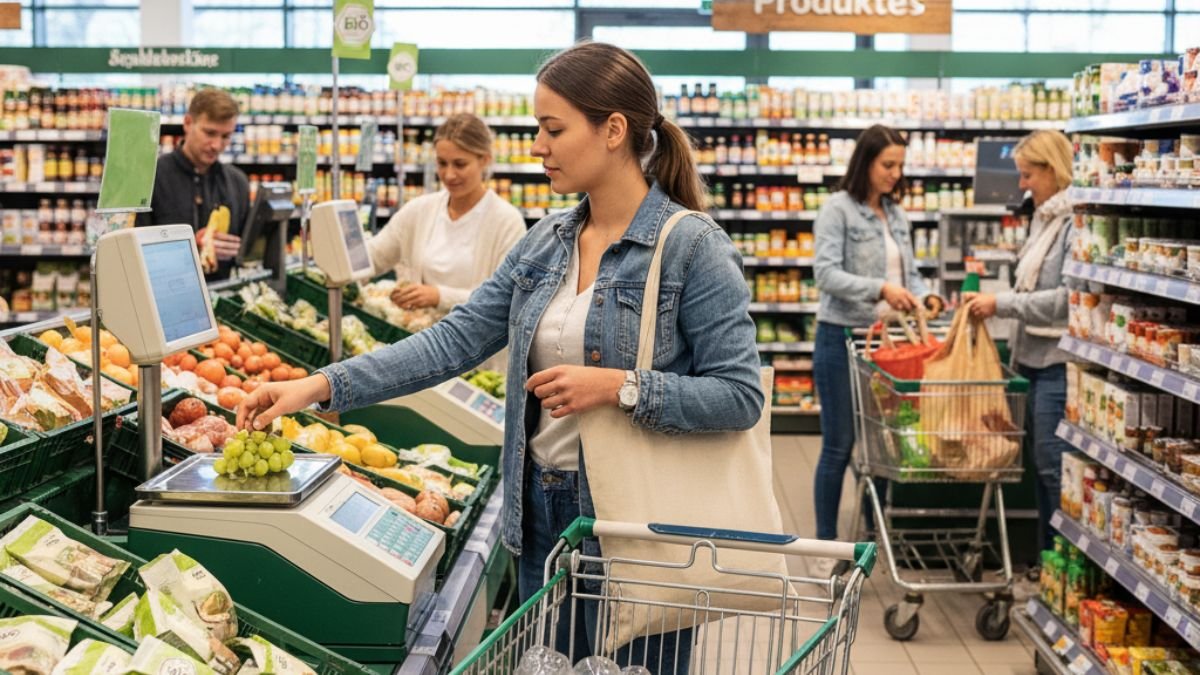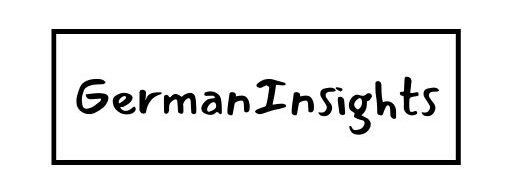Top 10 Tips for Stress-Free Grocery Shopping in Germany

To make grocery shopping in Germany stress-free, it is crucial to bring your own bags, have a coin for the shopping cart, and be prepared for fast checkouts. Remember that stores are typically closed on Sundays.
Here are the top 10 tips to help you navigate German supermarkets like a local.
- Bring Your Own Bags (BYOB): This is the golden rule of German grocery shopping. Plastic bags are not provided for free at the checkout. While you can purchase reusable bags (
Tragetaschen) at the store, most shoppers bring their own collection of sturdy totes, backpacks, or foldable bags. Keep a few in your car or backpack so you’re never caught without one. It’s not only economical but also much better for the environment. - You Need a Coin for the Cart: To use a shopping cart (
Einkaufswagen), you’ll almost always need a coin – typically a €0.50, €1, or €2 coin – to unlock it from the chain. You insert the coin into a slot on the handle, and it will be returned to you when you bring the cart back and re-insert the locking mechanism. Don’t have a coin? Many Germans keep a dedicated token (Einkaufswagenchip) on their keychain for this purpose, which you can often get for free at stores or banks. - Understand the “Pfand” System (Deposits on Bottles): Germany has a well-established bottle deposit system called
Pfand. When you buy drinks in plastic bottles or cans (and some glass bottles), you pay a small deposit (usually €0.25 for single-use items) on top of the price. To get your deposit back, you return the empty containers to a reverse vending machine (Pfandautomat), usually located near the entrance of any major supermarket. The machine will print a receipt that you can redeem for cash or use as a credit towards your next purchase at the checkout. - Weigh Your Own Produce: In many larger supermarkets like Rewe or Edeka, and almost always in smaller fruit and vegetable shops, you are expected to weigh your own produce. Place your fruits or vegetables in a bag, put it on the scale, press the corresponding picture or number for the item, and a sticker with the price and barcode will be printed. Stick this on your bag before you head to the checkout. Forgetting this step can hold up the line! Note: At discount stores like Lidl and Aldi, produce is typically priced per item or pre-packaged, so you don’t need to weigh it.
- Be Ready for Checkout Speed: Cashiers in German supermarkets are famous for their efficiency. They scan items at an astonishing speed. There is very little bagging area, and you are expected to move your items from the conveyor belt into your cart or bag just as quickly. Don’t try to bag your groceries at the checkout counter; the person behind you will be waiting. The standard practice is to quickly load everything back into your cart and then move to a designated bagging area or your car to sort and pack your items properly.
- Opening Hours are Limited: Unlike in many countries where 24/7 shopping is common, German stores have strict opening hours. Most supermarkets close by 8:00 PM or 10:00 PM on weekdays and Saturdays. Crucially, almost all grocery stores are closed on Sundays and public holidays. Plan your shopping accordingly and make sure you have everything you need for the weekend by Saturday afternoon.
- Cash is Still King (Sometimes): While credit and debit card acceptance has become much more common, it’s not universal. Smaller shops, bakeries (
Bäckereien), and some discount supermarkets may still prefer cash or only accept the GermanEC-Karte(a specific type of debit card). It’s always a good idea to have some cash on hand, just in case. - Explore the “Discounter” and “Supermarkt” Difference: Germany has two main types of grocery stores.
- Discounters like Aldi, Lidl, and Netto offer lower prices, a more limited selection, and often display products directly in their shipping boxes. They are great for basics and pantry staples.
- Supermarkets (
Supermärkte) like Edeka, Rewe, and Kaufland offer a wider variety of brands, a larger produce section, and specialized counters for meat, cheese, and baked goods. They are generally a bit more expensive but provide a one-stop-shop experience.
- Look for Regional and Organic Products: Germans place a high value on quality, and you’ll find an excellent selection of organic (
Bio) products in almost every store. Look for the green hexagonalBio-Siegelwhich indicates the product meets EU organic standards. Many stores also pride themselves on carrying regional products, which is a great way to support local farmers and try fresh, seasonal food. - Shop at weekly markets (Wochenmärkte): For very fresh produce, meats, and cheeses, consider visiting a local weekly market. They are a great place to find high-quality, seasonal items, though you will likely need cash
If you’re looking for more blog like Aldi vs. Lidl vs. Rewe – Where Should You Shop? and German Grocery Prices in 2025 subscribe to join us.






